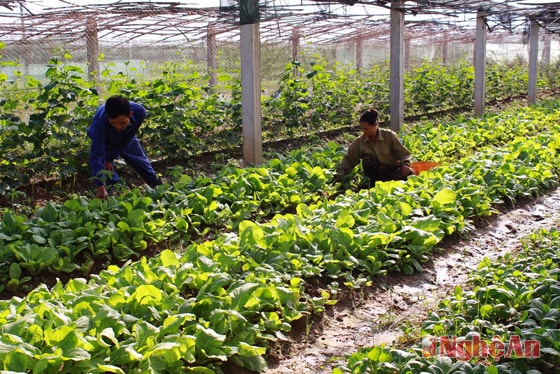Growing safe vegetables for high income in Nghi Lien
(Baonghean) - When it was first established, the safe vegetable production model of the Women's Union of Hamlet 2, Nghi Lien Commune (Vinh City) had only 17 participating households with an area of nearly 0.6 hectares; to date, it has attracted 39 participating households with a total area of over 3 hectares. The safe vegetable growing model has helped many poor women and policy families have a stable life and strive to become rich.
 |
| Safe vegetable model of Ms. Nguyen Thi Thanh Dong in hamlet 2, Nghi Lien commune. |
| RELATED NEWS |
|---|
Ms. Dong's family is a poor household, having to earn a living from meal to meal. In 2012, the Women's Union and the Farmers' Association of Nghi Lien commune, in collaboration with the provincial Department of Agriculture, Forestry and Fisheries Management, implemented a model of safe vegetable production according to VietGAP standards. She and her sisters in the village participated in a training course and learned about safe and effective vegetable growing. From there, she decided to convert her family's 6 sao of land from rice cultivation to specialized vegetable cultivation. Thanks to complying with the safe vegetable production processes according to VietGAP standards and investing in care, her family's vegetable garden is always green and lush, bringing in high income.
The safe vegetable production model in Hamlet 2, Nghi Lien Commune not only brings economic efficiency, but more importantly, it contributes to raising awareness among women in ensuring food hygiene and safety. At the same time, the clean vegetable model has contributed to solving regular, seasonal jobs for local women. Ms. Pham Thi Thao, a typical member of the Women's Union of Hamlet 2 who overcame difficulties to become rich from the safe vegetable growing model, said: In the past, growing vegetables according to tradition, income was unstable, depending on the weather, so sometimes there was a "good harvest", sometimes there was "empty-handed". There were times when pests damaged vegetables, crop failures, seeing the vegetables and fruits shriveled up, it was heartbreaking. In desperation, she bought some pesticides, growth stimulants for vegetables and fruits of unknown origin to spray and irrigate. Since attending a class on safe vegetable growing models, she has realized that those drugs are harmful to health, and more seriously, the residue of the drugs can leave consequences for future generations. Since then, she has switched to a safe vegetable growing model using science and technology, her vegetable area has high productivity and is safe. With an income of 10 million VND/month, she has the conditions to raise her children, buy a milling machine, and buy household amenities. In 2014, Ms. Thao was honored to be chosen as the face of Hamlet 2 to report on the typical model of the Farmers' Association growing safe vegetables.
Currently, the Women's Union of Hamlet 2 has established a club called "Helping each other develop the economy", contributing revolving capital, supporting women in difficult circumstances to invest in developing practical and effective economic models, and escape poverty sustainably. Ms. Nguyen Thi Hue, a member who received a loan, said: A few years ago, my family's life was very difficult. We had land for production, but no capital and lacked understanding of livestock and crop farming techniques, so production failed. The Women's Union of Hamlet 2 created conditions for her and her husband to borrow capital and invest in an effective safe vegetable growing model. To date, Ms. Hue is known as an example of a woman who is good at doing business.
The safe and clean vegetable growing model has contributed to promoting the sustainable development of Nghi Lien Hamlet 2's economy. When it was first established, this model only had 17 households participating with an area of nearly 0.6 hectares. But up to now, the hamlet's safe vegetable production model has attracted 39 households to participate with a total area of over 3 hectares. Some households have become typical examples of good production and business and have successfully implemented the emulation movement to build a prosperous, equal, progressive and happy family. The Women's Association of the hamlet regularly improves the quality of club activities by topic, helping women gain more experience in organizing family life, spending reasonably, raising healthy children, and teaching good children. Since then, Hamlet 2 has always been the leading unit in the commune in cultural, sports and learning promotion movements.
Ms. Truong Thi Lien, Head of the Women's Association of Hamlet 2, excitedly said: "Vegetable production according to VietGAP standards must follow a very strict process. At first, the members were not familiar with it, so when implementing the model, they encountered many difficulties. However, after a few crops, seeing the benefits of vegetable production according to VietGAP standards, many households voluntarily registered to participate. Compared to rice, the safe vegetable growing model is much more economically efficient. To overcome difficulties in consuming safe vegetable products, some households have proactively built their own "brands". That is, planting many new types of plants, paying attention to lighting systems, paying attention to irrigation to be able to grow plants that can be harvested all year round, especially off-season vegetables. In consumption, households find their own customers and ensure customers about the quality and reliability of the products. Thanks to that, there are currently about 10 households that have built a brand, earning 4 million VND/sao per month.
Ms. Nguyen Thi Bang - President of Nghi Lien Commune Women's Union, said: With continuous efforts, the Women's Union of Hamlet 2 has been one of the leading units in the commune for many years in economic, cultural and social development movements. In 2014, the Women's Union of Hamlet 2 was honored to receive a reward from the Vinh City Women's Union for its achievements in women's movements and environmental sanitation in new rural areas.
Pham Ngan
